- Home
- Deborah Smith
On Grandma's Porch
On Grandma's Porch Read online
Praise for Sweet Tea Story Collections...
“Warm and fun”
—Heartland Reviews
“The Sweet Tea books clearly define what it means to be Southern with a Southern family.”
—Newnan Times Herald, Newnan, Georgia
“If you don’t recognize a family member or can’t recall a story that could be a twin to one in here, you’re a Yankee. That mystical union of Southern pride, sensibilities, and practical faith traipse in all their glory through these stories.”
—VABooks! Center for the Book
“This book is rich in storytelling and makes me long for those Southern days as a child listening to the stories of the past.”
—Barbara Dooley, author, radio talk show host, and wife of University of Georgia Athletic Director, Vince Dooley.
“Miss Julia would feel right at home on the front porches and in the living rooms and kitchens where these delightful stories originated.”
—Ann B. Ross, author of Miss Julia Speaks Her Mind.
“Storytelling is back with all its Southern habits and charms, thanks to six women who are making it easier to get it in print. The stories are so good you’ll be hungry for more.”
—Liz Carpenter, acclaimed author and former press secretary for Lady Bird Johnson.
“A brilliant compilation of Southern women’s stories in the tradition of Anne Rivers Siddons.”
—Harriet Klausner, Midwest Book Review.
“Sweet Tea and Jesus Shoes is a feast for any reader.”
—Lisa Knighton, editor, Georgia Women Speak
“A major talent of the genre.”
—Publishers Weekly
“Densely imagined . . . brilliant.”
—Kirkus Reviews
“Mesmerizing . . . refreshing and compelling.”
—Library Journal
“A storyteller of distinction.”
—BookPage
“Funny, suspenseful, and swift-moving.”
—Library Journal
“Conversational and down to earth.”
—Library Journal
On Grandma’s Porch
by
Debra Leigh Smith
Sandra Chastain
Martha Crockett
Susan Goggins
Maureen Hardegree
Lynda Holmes
Julia Horst Schuster
Bert Goolsby
Clara Wimberly
Ellen Birkett Morris
Susan Sipal
Susan Alvis
Michelle Roper
Mike Roberts
Betty Cordell
Sarah Addison Allen
BelleBooks, Inc.
Copyright
This is a work of fiction. Names, characters, places and incidents are either the products of the author’s imagination or are used fictitiously. Any resemblance to actual persons (living or dead), events or locations is entirely coincidental.
BelleBooks
PO BOX 300921
Memphis, TN 38130
Ebook ISBN: 978-1-935661-21-4
Print ISBN: 978-0-9768760-2-1
Copyright © 2007 by BelleBooks, Inc.
Getting to the Heart of the Watermelon, © 2007 by Lynda Holmes
Ants Gotta Bite, Sun Gotta Burn, © 2007 by Julia Horst Schuster
A Presbyterian Cookbook, © 2007 by Bert Goolsby
A Doll With Red Hair, © 2007 by Clara Wimberly
Homeplace, © 2007 by Ellen Birkett Morris
Listening for Daddy, © 2007 by Debra Leigh Smith
Grandma’s Cupboard, © 2007 by Susan Sipal
The Tie That Binds, © 2007 by Susan Alvis
The Green Bean Casserole, © 2007 by Sandra Chastain
Liberal Redneck Babe, © 2007 by Debra Leigh Smith
The Good Son, © 2007 by Maureen Hardegree
The Wart Witch, © 2007 by Susan Goggins
A Patchwork Journey, © 2007 by Michelle Roper
Air Raid, Southern Style, © 2007 by Mike Roberts
Miss Lila’s Hat, © 2007 by Betty Cordell
I’ll See You In My Dreams, © 2007 by Sarah Addison Allen
Y’all Come, © 2007 by Martha Crockett
Gone, Gonna Rise Again used with permission, Si Kahn
Printed and bound in the United States of America.
All rights reserved. No part of this book may be reproduced in any form or by any electronic or mechanical means, including information storage and retrieval systems, without permission in writing from the publisher, except by a reviewer, who may quote brief passages in a review.
Visit our websites – www.BelleBooks.com and www.BellBridgeBooks.com.
10 9 8 7 6 5 4 3 2
Cover design: Debra Dixon
Interior design: Hank Smith, Martha Crockett
Cover photograph: Dmitry Moshalkov:
Epg:01:
Dedication
When you read On Grandma’s Porch, think of Virginia Ellis. Gin was a founding partner of BelleBooks, and her talent and commitment shine brightly in this collection. An award-winning writer (and a good ol’ southern gal from Florida,) she contributed a wonderful southern sensibility to selecting the stories for this book. She encouraged the writers, many of whom she sought out personally, giving them opportunities to publish their work. She found, purchased and edited most of the stories in our previous collection, More Sweet Tea. This book would not be what it is without Gin. We’ll continue to celebrate her work and her life in every sip of sweet tea, every wonderful southern sunrise, and every heartfelt tradition she loved. On Grandma’s Porch is dedicated for now and always to our friend, partner, and sister of the heart, Gin Ellis.
“I was blessed with humble beginnings.”
—Dolly Parton
Do You Remember When...
Soft drink machines always had a metal rack next to them for the empty bottles. If you took your drink with you, you were supposed to leave a two-cent deposit for the bottle. You put the two cents in the machine’s coin slot.
Kids’ toys included serious, sometimes dangerous, chemistry kits.
Telephone numbers included words as well as numbers. For example: “Poplar 67056,” which was written as PO67056, or “Plaza 39824” which was written as PL39824.
Your parents took you to a nice dinner at the local cafeteria, where young men in waiters’ coats carried your trays to the table for a small tip.
A “bag boy” always took your groceries to the car for your mother, and she tipped him fifty cents.
Gas stations had attendants who pumped your gas, cleaned your windshield, and checked your oil and tires.
Men and women always wore hats in public. Women held their hats in place with long, thick hat pins. Women routinely wore white gloves in public. They didn’t wear pants in public, and they always wore hose with their dresses or skirts.
Blue jeans were called dungarees.
Kids played with Erector Sets and hula hoops.
Playground equipment was made of sharp steel.
The Good Son
by Maureen Hardegree
“Anything to do with the South resonates with me, because I’m Southern.”
—Mary Steenburgen, actress
The dead, pretty much, have to take whatever we want to do to them “lying down,” so to speak. But can you use the dead, I wondered, to make the living happy?
I hadn’t ever
contemplated that question until recently, and why would I? Why would anyone other than a physician, mortician, or anatomy instructor?
Guess I’d better begin at the beginning.
It was the first cold, crisp day of fall when I walked through the back door of my house and encountered my mother sitting at the kitchen table. She raised her gray head, dabbed her teary eyes with some tissue, and sighed.
I glanced out the window at the yellow leaves, which earlier in the week my wife had informed me were actually a burnished gold. The sky was a pretty blue. It was the kind of day that made most people happy—but not my mother.
“Hi, Mom,” I said with forced joviality and tossed my keys onto the desk.
Rather than answer in kind, she blinked at me, then her small face crumpled like the tissue in her plump hand and she started boo-hooing in earnest.
From the hunger-inducing smell of mozzarella, beef and garlic, I suspected my wife Hannah was baking a lasagna, which didn’t usually make my mother cry. It often did, however, prompt Mom to tell my wife how our family had never eaten Italian food for supper.
Maybe Hannah had borrowed one of Mom’s dishes again. All hell broke loose several months ago when Hannah pulled out the electric frying pan with the intent of using it to make pork chops. You’d have thought my wife had committed murder the way my mother had carried on.
Food cooking in the oven was only adding to my confusion. School was in session. Why was my wife home before sundown and preparing a hot meal? Had someone died?
“What’s wrong, Mom?”
“Why did you let me leave your father in Augusta?”
Mom’s genteel Piedmont accent often lulled people into thinking she hadn’t truly meant whatever hurtful thing she’d said, but I wasn’t most people. I heard the veiled accusation—his being in Augusta was somehow my fault.
“Maybe because he’s been dead for six years,” I said. “I don’t think he minds.”
“Well, I don’t want him there anymore. I can’t drive down to see him without taking the whole day. Besides, I don’t want to be in Augusta when I die. I want to be in Rutledge.”
“Your plot happens to be in Augusta, Mother. In fact, you’ve got seven of them.”
“Can’t we move him?”
Hannah, who was tearing the lettuce for a salad, drew her breath in sharply. Mom’s question didn’t shock me. She’d been talking about moving him ever since the questions began about when Davy, my father, was going to get his tombstone.
“Daddy,” I started to say, and my wife snorted.
The way I say “daddy” amuses her to no end. My wife, a Yankee I married to help the height of my gene pool, claimed “daddy” sounded like “diddy” when I said it.
I tried to ignore the snort. “Daddy didn’t want to be buried in the first place, and now you want me to move him to the Rutledge Cemetery? He hated that town.”
Mom stood. Her little body shook like her voice. “I don’t care.”
My father, a former Army officer, left the sleepy Georgia town where he’d grown to manhood as soon as he was able. He’d also provided clear instructions on what he wanted done at his death, which had come much sooner than any of us had imagined it would. A heart attack at fifty-three. He lingered in the hospital for a week.
Of course, the fact that Daddy was a drinker and smoker didn’t help. Since his death, though, who he’d been and what he’d wanted and liked had morphed into a person I didn’t recognize. His name changed from Davy to Ezekiel, his middle name, and he’d become a saint, a teetotaler, and a man who was kind to all animals including the deer viewing his garden as an all-you-can-eat buffet. Several family members had even attempted praying his atheistic soul into heaven.
Dad had wanted to be cremated and to have his ashes added to the soil in his garden, which had rivaled the one on the PBS show “The Victory Garden” in neatness and beauty.
He’d canned his own vegetables, and his days in the summer and spring were spent weeding and protecting his fenced domain from the bed of his white Chevy pick-up. Deer and other animals daring to trespass for a little nibble got a load of buckshot. His company during his garden-guarding vigil? A shotgun, a pack of menthol Benson & Hedges, and a tall glass of sweet tea. A screwdriver, the drink, not the tool, was actually his favorite beverage but wasn’t appropriate during those after-hours guarding episodes.
Even if his remains wouldn’t be in the ground, he’d wanted a monument in a cemetery, and he truly liked the plot in Augusta, which had belonged to my mother’s great-grandmother and had passed down to Mom. A tall oak shaded the ground, the perfect spot, in his opinion, for a nice granite headstone that mentioned his service to his country.
When Dad died, my mother was a mess, so I couldn’t count on her to follow through on his wishes. She’d always been what her family referred to as high-strung.
Since she couldn’t, I voiced what he’d wanted to the family at large, and the mention of cremation made one of my elderly relative’s pale skin go stark white. Her blue eyes widened like she’d seen a ghost. I was afraid she would have a heart attack, and we’d have two funerals to argue over.
My uncle quietly suggested a traditional burial, complete with displaying the dead body in the dining room of my parents’ house and what we call “sitting up with the dead.” I didn’t sit up with Dad all night, and no one that I know did. I slept upstairs almost directly above the casket, which might be close enough. My Yankee wife was pretty shocked when I told her about that little tradition years later. I explained that I was only trying to be a good son, nephew, and grandson.
In the years since Dad’s funeral, Mom had never pulled herself together (which is why she was living with me and my wife), nor could she bring herself to buy Dad’s monument. I was still trying to be the good son—”trying” being the key word, because she was trying my patience to no end.
If I wasn’t dreaming, Mom wanted me to move my father, a man who never wanted to be buried, to their homeplace, Rutledge, a town he hated. I had to take a stand for him. “You can’t move him there.”
Mom worked her lips in and out in a down-turned pout. “Why not? I don’t care how much it costs.”
“You know he didn’t want to be buried at all, much less in Rutledge.”
“That’s not true.” She worked her lips faster. Her eyes brimmed to full pool.
“Yes it is. Why don’t we just pick out a monument? I’ll come home early tomorrow afternoon and take you to the place on the highway.”
She scraped her chair back from the table and fisted her small, puffy hands. “You’ve taken everything from me, and now you want to keep your father where I can’t go see him.”
My wife pulled the lasagna out of the oven and slammed it down on the stove. Her face was flushed, with anger I suspected. I knew what she was thinking. Right, being newly married we wanted nothing more than to take care of my crazy mother just so we could have all her things, such as the circa 1968 burnt-orange bedspread in the guest room and her deviled egg tray.
“Look, Mom, you can’t exactly see someone who’s buried, anyway.”
“You’re just being hateful,” Mom said, now fully into the drama of her role. She’d be the first to tell you she liked to emote. With her lips pursed and the tears flowing, she stomped through the den to her bedroom and slammed the door behind her, her trademark gesture.
She’d played her trump card to perfection, accusing me, her perfect only son, of being hateful.
Now I was angry, too.
“Fine,” I yelled from the other side of the door separating us. “You want to move him, we’ll move him.”
My wife probably thought I was as touched as my mother.
I stormed into the living room and dug through the drawers in the secretary to locate all the funeral papers. I unzipped the pouch from the mor
tuary that overflowed with sympathy cards Mom couldn’t bring herself to throw away, and I found the phone number.
“You aren’t serious, are you?” Hannah asked. She must have finished with the salad.
“He was used to moving around with the army.”
“You aren’t kidding.”
“Nope, I’m trying to be a good son. If moving him will make my mother happy, does it really matter where his body is?”
“Correct me if I’m wrong,” she said. “But didn’t he make her promise not to ever bury him there?”
“It’s not like he’s even going to know. And if it’ll get my mother to stop crying and obsessing, I win.”
“I hate to tell you, Clay, but I don’t think it’s possible for her to stop crying and obsessing.”
“Very funny,” I said.
I dialed the number. What sort of message would I leave on the answering machine? You buried my father six years ago, and he’s ready for a change of scenery. I had no doubt this would be expensive and involve more than one funeral home, two county governments, and a mountain of paper. But the move would be worth it if it helped Mom settle down. I listened to the recording providing the funeral home’s viewing hours. The line must have been busy, so I’d been transferred to the automated service.
The beep sounded, and I said the first thing that came to mind. “I want to move my dad to a different cemetery. What do I need to do? Please call me at . . . “
I walked back into the kitchen, where Hannah was setting the table with our stoneware rather than Mom’s off-limits dishes, and I placed the phone in its cradle.
My wife shook her head. “If your father starts haunting you, don’t say I didn’t warn you.”
Several days later, as I remained on hold with the Rutledge Cemetery, I wasn’t plagued by Daddy’s ghost as much as by worries about the potential disasters that could occur while the Augusta funeral home moved him. Apparently, they would transport him vault-and-all via truck (for the vault) and hearse (for Daddy) up Interstate 20. That concrete-and-asphalt corridor from Augusta to metro Atlanta hadn’t yet encroached on the small-town serenity of Rutledge, where my parents had been high school sweethearts, but one day soon it would.

 Legends
Legends Hold on Tight
Hold on Tight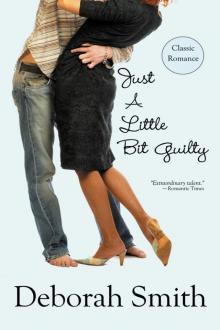 Just a Little Bit Guilty
Just a Little Bit Guilty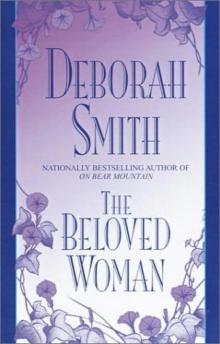 The Beloved Woman
The Beloved Woman Alice At Heart
Alice At Heart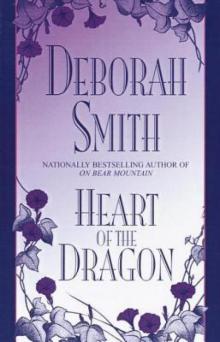 Heart of the Dragon
Heart of the Dragon Critters of Mossy Creek
Critters of Mossy Creek Diary of a Radical Mermaid
Diary of a Radical Mermaid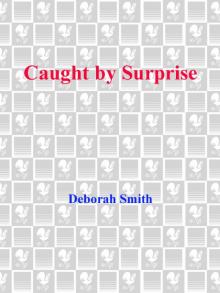 Caught by Surprise
Caught by Surprise Stranger in Camelot
Stranger in Camelot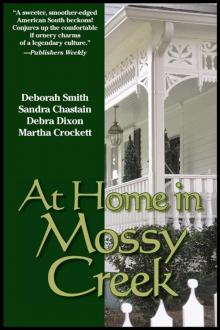 At Home in Mossy Creek
At Home in Mossy Creek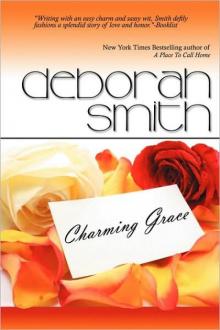 Charming Grace
Charming Grace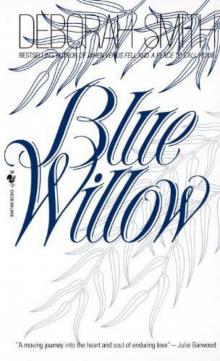 Blue Willow
Blue Willow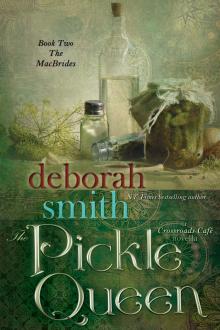 The Pickle Queen: A Crossroads Café Novella
The Pickle Queen: A Crossroads Café Novella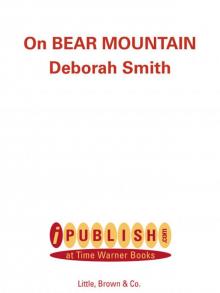 On Bear Mountain
On Bear Mountain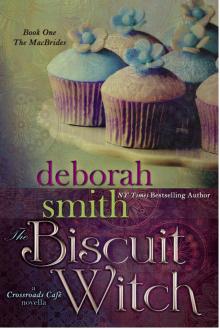 The Biscuit Witch
The Biscuit Witch Sara's Surprise
Sara's Surprise More Sweet Tea
More Sweet Tea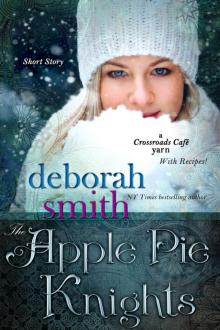 The Apple Pie Knights
The Apple Pie Knights The Silver Fox and the Red-Hot Dove
The Silver Fox and the Red-Hot Dove Sweet Hush
Sweet Hush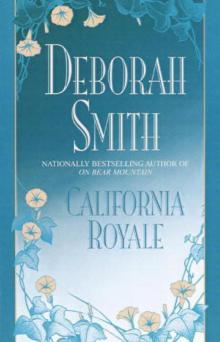 California Royale
California Royale Hot Touch
Hot Touch Miracle
Miracle The Stone Flower Garden
The Stone Flower Garden A Place to Call Home
A Place to Call Home Silk and Stone
Silk and Stone Honey and Smoke
Honey and Smoke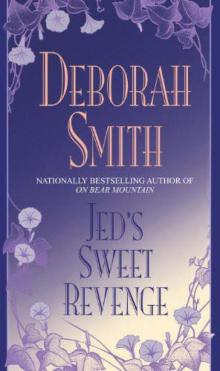 Jed's Sweet Revenge
Jed's Sweet Revenge Silver Fox and Red Hot Dove
Silver Fox and Red Hot Dove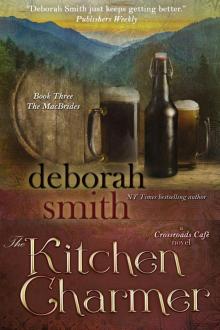 The Kitchen Charmer
The Kitchen Charmer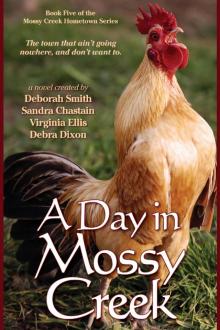 A Day in Mossy Creek
A Day in Mossy Creek Never Let Go
Never Let Go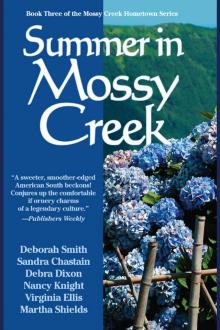 Summer in Mossy Creek
Summer in Mossy Creek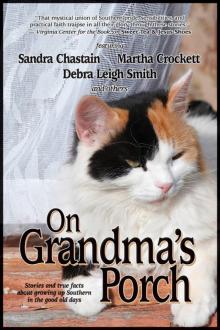 On Grandma's Porch
On Grandma's Porch The Crossroads Cafe
The Crossroads Cafe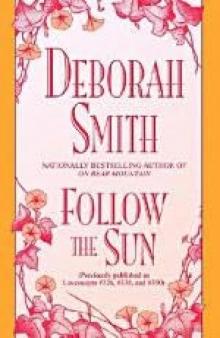 Follow the Sun
Follow the Sun The Yarn Spinner
The Yarn Spinner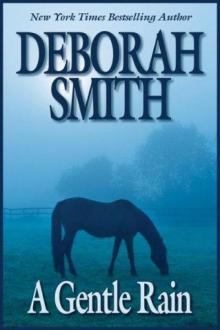 A Gentle Rain
A Gentle Rain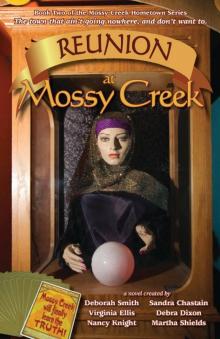 Reunion at Mossy Creek
Reunion at Mossy Creek